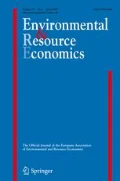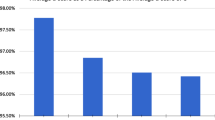Abstract
Prescriptive consequentialism informs currentassessments of rational action in economics. Choice is alleged to start with stable andknown preferences over alternative outcomes,and rational agents choose actions thatmaximize well being with respect to thesepreferences. Evidence suggests that thisformulation fails as an accurate and reliabledescription of how individuals make choices,and this formulation seems particularly at oddswith collective decision making with respect toenvironmental policy. Pragmatism, an importantbranch of philosophy, offers a theory of humanaction that economists would find helpful. This promise is especially pertinent to effortsdevoted to the assignment of values to parts ofnature, and to environmental policy in general.
Similar content being viewed by others
References
Akerlof, G. (1970), ‘The Market for “Lemons”: Quality Uncertainty and the Market Mechanism’, The Quarterly Journal of Economics 84(3), 488–500.
Akerlof, G. and W. T. Dickens (1982), ‘The Economic Consequences of Cognitive Dissonance’, American Economic Review 72(3), 307–319.
Alpay, E., S. Buccola and J. Kerkvliet (2002), ‘Productivity Growth and Environmental Regulation in Mexican and U.S. Food Manufacturing’, American Journal of Agricultural Economics 84(4), 887–901.
Altman, M. (2001), ‘When Green Isn't Mean: Economic Theory and the Heuristics of the Impacts of Environmental Regulations On Competitiveness and Opportunity Cost’, Ecological Economics 36(1), 31–44.
Arrow, K. J., M. J. Cropper, G. C. Eads, R.W. Hahn, L. B. Lave, R. G. Noll, P. R. Portney, M. Russell, R. Schmalensee, K. V. Smith and R.N. Stavins (1996), ‘Is There a Role for Benefit-Cost Analysis in Environmental, Health, and Safety Regulation?’, Science 272 (12 April), 221–222.
Blackorby, C. and D. Donaldson (1990), ‘A Review Article: The Case against the Use of the Sum of Compensating Variations in Cost-Benefit Analysis’, Canadian Economics Journal 3 (August), 471–494.
Boadway, R.W. (1974), ‘TheWelfare Foundations of Cost-Benefit Analysis’, Economic Journal 84, 926–939.
Boadway, R. W. (1976), ‘Integrating Equity and Efficiency in Applied Welfare Economics’, Quarterly Journal of Economics 90, 541–556.
Boadway, R. W. and N. Bruce (1984), Welfare Economics. Oxford: Blackwell.
Bowles, S. (1998), ‘Endogenous Preferences: The Cultural Consequences of Markets and Other Economic Institutions’, Journal of Economic Literature 36 (March), 75–111.
Brandom, R. B. (1994), Making it Explicit: Representing, and Discursive Commitment. Cambridge, Massachusetts: Harvard University Press.
Brandom, R. B. (2000), Articulating Reasons. Cambridge, Massachusetts: Harvard University Press.
Brock, W. A. and D. Colander (2000), ‘Complexity and Policy’, in D. Colander, ed., The Complexity Vision and the Teaching of Economics. Cheltenham, UK: Elgar.
Bromley, D.W. (1989a), Ecomomic Interests and Institutions: The Conceptual Foundations of Public Policy. Oxford: Blackwell.
Bromley, D. W. (1989b), ‘Entitlements, Missing Markets and Environmental Uncertainty’, Journal of Environmental Economics and Management 17(2), 181–194.
Bromley, D. W. (1990), ‘The Ideology of Efficiency: Searching for a Theory of Policy Analysis’, Journal of Environmental Economics and Management 19(1), 86–107.
Bromley, D. W. (1991), Environment and Economy: Property Rights and Public Policy. Oxford: Blackwell.
Bromley, D. W. ed. (1992a), Making the Commons Work: Theory, Practice, and Policy. San Francisco: ICS Press.
Bromley, D. W. (1992b), ‘The Commons, Common Property, and Environmental Policy’, Environmental and Resource Economics 2, 1–17.
Bromley, D. W. (1993), ‘Regulatory Takings: Coherent Concept of Logical Contradiction’, Vermont Law Review 17(3), 647–682.
Bromley, D. W. (1995), Property Rights and Natural Rescource Damage Assessment', Ecological Economics 14, 129–135.
Bromley, D. W. (1997a), ‘Rethinking Markets’, American Journal of Agricultural Economics 79(5), 1383–1393.
Bromley, D. W. (1997b), ‘Constitutional Political Economy: Property Claims in a Dynamic World’, Contemporary Economic Policy 15(4), 43–54.
Bromley, D. W. (1998), ‘Searching for Sustainability: The Poverty of Spontaneous Order’, Ecological Economics 24, 231–240.
Bromley, D.W. (2000), ‘Can Agriculture Become an Environmental Asset?’, World Economics 1(3), 127–139.
Bromley, D.W. and J. Paavola, eds. (2002), Economics, Ethics, and Environmental Policy: Contested Choices. Oxford: Blackwell.
Chipman, J. S. and J. C. Moore (1978), ‘The New Welfare Economics: 1939-1974’, International Economic Review 19(3), 547–584.
Coate, S. (2000), ‘An Efficiency Approach to the Evaluation of Policy Changes’, The Economic Journal, 110 (April), 437–455.
Cooter, R. and P. Rappoport (1984), ‘Were the Ordinalists Wrong about Welfare Economics?’, Journal of Economic Literature 22 (June), 507–530.
Damasio, A. R. (1999), The Feeling of What Happens. New York: Harcourt Brace.
Damasio, A. R. (2000), Descartes' Error. New York: Harper Collins.
Deblonde, M. (2002), Economics as a Political Muse: Philosophical Reflections on the Relevance of Economics for Ecological Policy. New York: Kluwer Academic Publishers.
Diamond, P. A. and J. A. Hausman (1994), ‘Contingent Valuation: Is Some Number Better than No Number?’, Journal of Economic Perspectives 8(4), 45–64.
Field, A. J. (1979), ‘On the Explanation of Rules Using Rational Choice Models’, Journal of Economic Issues 13 (March), 49–72.
Field, A. J. (1981), ‘The Problem with Neoclassical Institutional Economics: A Critique with Special Reference to the North/Thomas Model of Pre-1500 Europe’, Explorations in Economic History 18, 174–198.
Gabel, H. L. and B. Sinclair-Desgagné (1998), ‘The Firm, its Routines and the Environment’, in T. Tietenberg and H. Folmer, eds., The International Yearbook of Environmental Economics: 1998-1999 (Chapter 3). Cheltenham, UK: Edward Elgar.
Gillroy, J. M. (1992), ‘The Ethical Poverty of Cost-Benefit Methods: Autonomy, Efficiency, and Public Policy Choice’, Policy Science 25, 83–102.
Gorman, W. M. (1955), ‘The Intransitivity of Certain Criteria Used in Welfare Economics’, Oxford Economic Papers (new series) 7(1), 25–35.
Graaff, J. de V. (1957), Theoretical Welfare Economics. Cambridge Cambridge: University Press.
Gregory, R., S. Lichtenstein and P. Slovic (1993), ‘Valuing Environmental Resources: A Constructive Approach’, Journal of Risk and Uncertainty 7, 177–197.
Hahn, F. H. (1970), ‘Some Adjustment Problems’, Econometrica 38 (January), 1–17.
Hiedanpää, J. and D.W. Bromley (2002), ‘Environmental Policy as a Process of Reasonable Valuing’, in D. W. Bromley and J. Paavola, eds., Economics, Ethics, and Environmental Policy: Contested Choices (Chapter 5). Oxford: Blackwell.
Holland, A. (2002), ‘Are Choices Tradeoffs?’ in D. W. Bromley and J. Paavola, eds., Economics, Ethics, and Environmental Policy: Contested Choices (Chapter 2). Oxford: Blackwell.
Hoover, K. D. (1994), ‘Pragmatism, Pragmaticism, and Economic Method’, in R. Backhouse, ed., Contemporary Issues in Economic Methodology. London: Routledge.
Joas, H. (1993), Pragmatism and Social Theory. Chicago: University of Chicago Press.
Johansson-Stenman, O. (2002), ‘What Should We Do with Inconsistent, Nonwelfaristic, and Undeveloped Preferences?’, in D. W. Bromley and J. Paavola, eds., Economics, Ethics, and Environmental Policy: Contested Choices (Chapter 7). Oxford: Blackwell.
Larson, B. A. and D.W. Bromley (1990), ‘Property Rights, Externalities, and Resource Degradation: Locating the Tragedy’, Journal of Development Economics 33(2), 235–262.
Lawson, T. (1997), Economics and Reality. London: Routledge.
Lewin, S. B. (1996), ‘Economics and Psychology: Lessons for Our Own Day from the Early Twentieth Century’, Journal of Economic Perspectives 34 (September), 1293–1323.
Little, I. M. D. (1949), ‘A Reformulation of the Theory of Consumer's Behaviour’, Oxford Economic Papers 1, 90–102.
Mishan, E. J. (1969), Welfare Economics: An Assessment. Amsterdam: North-Holland.
Mishan, E. J. (1980), ‘How Valid Are Economic Evaluations of Allocative Changes?’, Journal of Economic Issues 14 (March), 143–161.
Mohr, R. D. (2002), ‘Technical Change, External Economies, and the Porter Hypothesis,’ Journal of Environmental Economics and Management 43(1), 158–168.
Norton, B. (2002), ‘The Ignorance Argument: What Must We Know to be Fair to the Future?’, in D. W. Bromley and J. Paavola, eds., Economics, Ethics, and Environmental Policy: Contested Choices (Chapter 3). Oxford: Blackwell.
Palmer, K., W. Oates, and P. R. Portney (1995), ‘Tightening Environmental Standards: The Benefit-Cost or the No-Cost Paradigm?’, Journal of Economic Perspectives 9 (Fall), 119–132.
Payne, J.W., J. R. Bettman and D. A. Schkade (1999), ‘Measuring Constructed Preferences: Towards a Building Code’, Journal of Risk and Uncertainty, 19(1.3), 243–270.
Peirce, C. S. (1934), Collected Papers: Vol 5. Cambridge, Massachusetts: Harvard University Press.
Peirce, C. S. (ed. by V. Tomas) (1957), Essays in the Philosophy of Science. New York: The Liberal Arts Press.
Porter, M. E. and C. van der Linde (1995), ‘Toward a New Conception of the Environment-Competitiveness Relationship’, Journal of Economic Perspectives 9 (Fall), 97–118.
Rabin, M. (1998), ‘Psychology and Economics’, Journal of Economic Literature 36 (March), 11–46.
Raz, J. (1997), ‘Incommensurability and Agency’, in R. Chang, ed., Incommensurability, Incomparability, and Practical Reason. Cambridge, Massachusetts: Harvard University Press.
Robbins, L. (1932), An Essay on the Nature and Significance of Economic Science. London: Macmillan.
Rorty, R. (1979) Philosophy and the Mirror of Nature. Princeton: Princeton University Press.
Rorty, R. (1982), Consequences of Pragmatism. Minneapolis: University of Minnesota Press.
Rorty, R. (1999), Philosophy and Social Hope. London: Penguin Books.
Russell, B. (1945), A History of Western Philosophy. New York: Simon and Schuster.
Samuels, W. J. (1971), ‘The Interrelations Between Legal and Economic Processes’, Journal of Law and Economics 14 (October), 435–450.
Samuels, W. J. (1974), ‘The Coase Theorem and the Study of Law and Economics’, Natural Resources Journal 14 (January), 1–33.
Samuels, W. J. (1989), ‘The Legal-Economic Nexus’, George Washington Law Review 57(6), 1556–1578.
Samuelson, P. A. (1950), ‘Evaluation of Real National Income’, Oxford Economic Papers (new series) 2(1), 1–29.
Satz, D. and J. Ferejohn (1994), ‘Rational Choice and Social Theory’, The Journal of Philosophy 91(2), 71–87.
Sen, A. (1993), ‘Markets and Freedoms: Achievements and Limitations of the Market Mechanism in Promoting Individual Freedoms’, Oxford Economic Papers 45, 519–541.
Shackle, G. L. S. (1961), Decision, Order, and Time in Human Affairs. Cambridge: Cambridge University Press.
Shapin, S. (1994), A Social History of Truth. Chicago: University of Chicago Press.
Slovic, P. (1995), ‘The Construction of Preferences’, American Psychologist 50, 364–371.
Slovic, P., D. Griffin and A. Tversky (1990), ‘Compatibility Effects in Judgment and Choice’, in R. M. Hogarth, ed., Insights in Decision Making: A Tribute to Hillel J. Einhorn (pp. 5–27). Chicago: University of Chicago Press.
Tribe, L. H. (1972), ‘Policy Science: Analysis or Ideology?’, Philosophy and Public Affairs 2(1), 66–110.
Vatn, A. (2002), ‘Efficient or Fair: Ethical Paradoxes in Environmental Policy’, in D. W. Bromley and J. Paavola, eds., Economics, Ethics, and Environmental Policy: Contested Choices (Chapter 10). Oxford: Blackwell.
Vatn, A. and D. W. Bromley (1994), ‘Choices Without Prices Without Apologies’, Journal of Environmental Economics and Management 26(2), 129–148.
Vatn, A. and D. W. Bromley (1997), ‘Externalities: A Market Model Failure’, Environmental and Resource Economics 9, 135–151.
Author information
Authors and Affiliations
Rights and permissions
About this article
Cite this article
Bromley, D.W. Reconsidering Environmental Policy: Prescriptive Consequentialism and Volitional Pragmatism. Environmental and Resource Economics 28, 73–99 (2004). https://doi.org/10.1023/B:EARE.0000023821.33379.b7
Issue Date:
DOI: https://doi.org/10.1023/B:EARE.0000023821.33379.b7




